UK says its working to verify allegations Russia used chemical agent in Mariupol; UN also calls for greater protection of Ukrainian children, says two-thirds are displaced
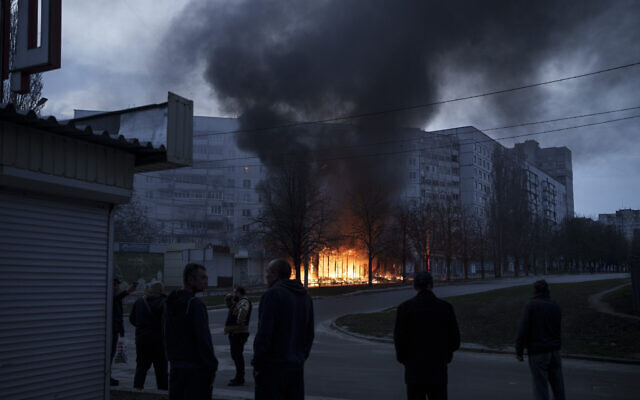
Britain is trying to verify reports that Russia has used chemical weapons in an attack on the besieged Ukrainian city of Mariupol, London’s top diplomat said on Monday.
The probe comes as the top officials at the United Nations called Monday for both an investigation into Russia’s violence against women during its invasion of Ukraine and the protection of children in the conflict.
“Reports that Russian forces may have used chemical agents in an attack on the people of Mariupol. We are working urgently with partners to verify details,” Foreign Secretary Liz Truss wrote on Twitter.
“Any use of such weapons would be a callous escalation in this conflict and we will hold Putin and his regime to account.”
Ukrainian lawmaker Ivanna Klympush said Russia had used an “unknown substance” in Mariupol and that people were suffering from respiratory failure. “Most likely chem.weapons!” she tweeted.
Ukraine’s Azov battalion in a Telegram message earlier on Monday had claimed a Russian drone dropped a “poisonous substance” on Ukrainian troops and civilians in Mariupol.
Azov: Russian occupation forces used in Mariupol a poisonous substance of unknown origin, which was dropped from an enemy UAV on civilians and the Ukrainian military pic.twitter.com/r4Sh0wmyi8
— Громадське радіо (@HromadskeRadio) April 11, 2022
The force also claimed that people were experiencing respiratory failure and neurological problems.
The battalion’s founder, Andrei Biletsky, said that three people were suffering effects from an unknown toxic substance.
“Three people have clear signs of poisoning by warfare chemicals, but without catastrophic consequences,” he said in a video address on Telegram.
AFP was unable to verify the claims.
President Volodymyr Zelensky warned Ukrainians on Monday that Russia might use chemical weapons in Mariupol. “We take this as seriously as possible,” he said in his nightly address, but did not confirm they had already been used.
Pentagon spokesman John Kirby said in a statement that the US could not confirm the drone report out of Mariupol. But Kirby noted the administration’s persistent concerns “about Russia’s potential to use a variety of riot control agents, including tear gas mixed with chemical agents, in Ukraine.”
Senior Donetsk separatist official Eduard Basurin had spoken of the possibility of using chemical weapons against the southern port city that has resisted Russian bombardment for weeks.
Basurin said the besieging forces could “turn to chemical troops who will find a way to smoke the moles out of their holes”, Russian news agency RIA Novosti quoted him as saying on Monday.
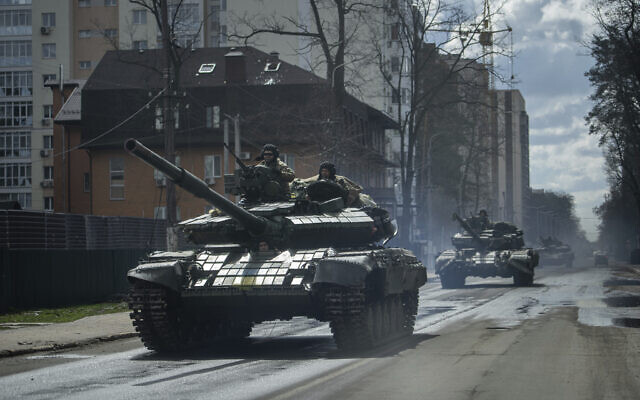
Russia has denied committing any war crimes during its offensive in Ukraine.
Nevertheless, the UN called for both an investigation into reports of rapes and for further protection of children in the conflict.
“This war must stop. Now,” Sima Bahous, director of the UN women’s agency, told a meeting of the Security Council in New York.
“We are increasingly hearing of rape and sexual violence. These allegations must be independently investigated to ensure justice and accountability.”
Bahous, who recently returned from a trip to the region, said the combination of “mass displacement with the large presence of conscripts and mercenaries, and the brutality displayed against Ukrainian civilians, has raised all red flags.”
It was not clear if the Security Council, on which Russia is a veto-wielding permanent member, would agree to any investigation.
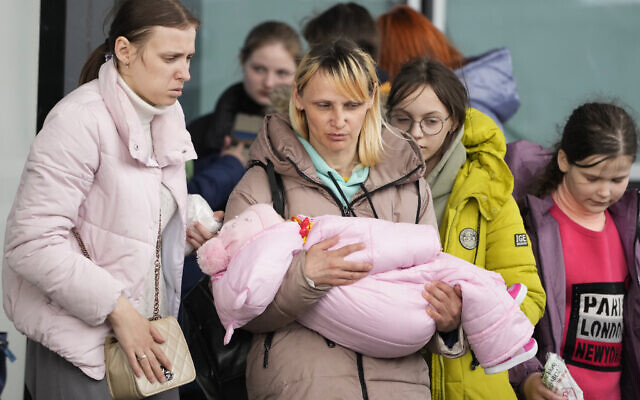
Russia on Monday again rejected accusations made by other members of the Security Council.
Russian deputy ambassador to the UN Dmitry Polyansky asked the group to respect the “presumption of innocence,” and insisted his country’s “special military operation” intended to “save Ukraine’s future.”
Manuel Fontaine, director of emergency programs at UNICEF, also called for an end to the war and warned of the risk to children of famine.
“Of the 3.2 million children estimated to have remained in their homes, nearly half may be at risk of not having enough food,” he told the council.
“The situation is even worse in cities like Mariupol and Kherson, where children and their families have now gone weeks without running water and sanitation services, a regular supply of food, and medical care.”
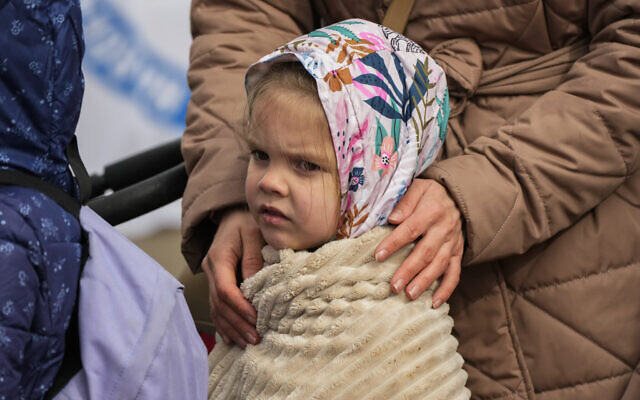
At a press conference, Fontaine estimated that two-thirds of Ukraine’s 7.5 million children are currently displaced — 2.8 million internally displaced within the country and another two million who are refugees outside Ukraine, for a total of 4.8 million.
“In a matter of six weeks. It’s just quite incredible,” he said.
During the Security Council meeting, Ukrainian Ambassador to the UN, Sergiy Kyslytsya, accused Russia of transporting 120,000 Ukrainian children to Russia to be adopted.
Fontaine said there was so far “no evidence” of such accusations, but that UNICEF would investigate the matter.
Prior to the meeting, Mona Juul, Norway’s ambassador to the UN, flagged the war’s impact on education for many Ukrainian children.
“According to the UN, 5.7 million children are affected by the nationwide closure of education facilities,” she told reporters.
“Schools are important, not only for the sake of education — but for protecting children: from violence, sexual abuse, and even trafficking.”
“Children are innocent. Always. Stop killing them. Stop destroying their future. Stop the war,” the Norwegian diplomat said.
US Ambassador Linda Thomas-Greenfield said that when men like Russian President Vladimir Putin “start wars, women and children get displaced,” hurt, raped and abused, and they die.
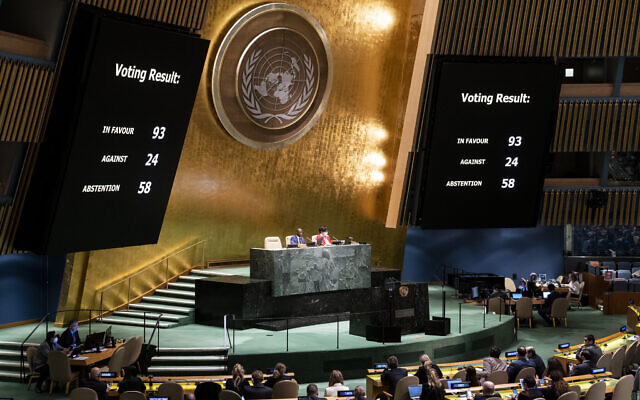
“Since the start of Russia’s unprovoked war against Ukraine, Russia has bombed orphanages and maternity hospitals,” she said. “We’ve seen mass graves with dead children stacked on top of each other.”
Albanian Ambassador Ferit Hoxha accused Russia of committing “unspeakable crimes” every day, including burning civilians, throwing bodies in mass graves, shooting into playgrounds, attacking schools on purpose, and leaving all Ukrainians suffering, especially women and children.
“In their normal life, children draw parents, houses and trees. Russia’s war has made Ukraine kids draw bombs, tanks and weapons,” Hoxha said.
Both the US and Albanian ambassadors, and many others, pointed to the discovery of bodies, some with hands tied behind their backs, in the town of Bucha on the outskirts of Kyiv following the withdrawal of Russian troops, and the missile that killed at least 52 mainly women and children at the train station in eastern Kramatorsk. Hoxha noted that the missile had “a vicious signature, `for our children.’”
Russia’s Polyansky blamed “Ukrainian Nazis” for civilian killings in Bucha and the bombing at the Kramatorsk station, which he called “a classic false flag operation.”
He accused Ukraine and its public relations experts, along with the West, of promoting “fakes and propaganda” as part of “the information war unleashed against Russia.”
“That war is as intense as the military operations on the ground,” he said.
Lord Tariq Ahmad, Britain’s minister of state for the UN who presided over the meeting, countered that Russia again was trying to deflect from the reality on the ground “by what can only be described as quite extraordinary statements, and even lies.”
“Yet, what is true, what is fact, is that Russian attacks on civilians and residential areas have been truly barbaric,” he said.
Russia invaded Ukraine on February 24, but has been met with an unexpectedly strong Ukrainian resistance as well as unprecedented sanctions imposed by a slew of countries.
As reported by The Times of Israel
